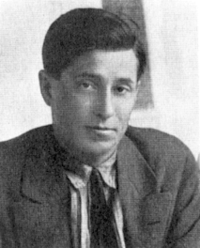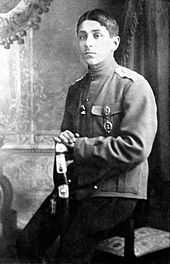- Mikhail Zoshchenko
-
Mikhail Zoshchenko 
Born August 10, 1895
Poltava, Russian Empire (now Ukraine)Died July 22, 1958 (aged 62)
Leningrad, USSRMikhail Mikhailovich Zoshchenko (Russian: Михаи́л Миха́йлович Зо́щенко, Ukrainian: Михайло Михайлович Зощенко; August 10 [O.S. 29 July] 1895, Poltava,[1] Russian Empire – July 22, 1958, Leningrad, USSR) was a Soviet author and satirist.
Contents
Biography
Zoshchenko was born in 1895, in Poltava,[1] but spent most of his life in St. Petersburg / Leningrad. His Ukrainian father was a mosaicist responsible for the exterior decoration of the Suvorov Museum in Saint Petersburg.[2] The future writer attended the Faculty of Law at the Saint Petersburg University, but did not graduate due to financial problems. During World War I Zoshchenko served in the army as a field officer, was wounded in action several times, and was heavily decorated.
He was associated with the Serapion Brothers and attained particular popularity in the 1920s as a satirist, but, after his denunciation in the Zhdanov decree of 1946, Zoshchenko lived in dire poverty. He was awarded his pension only a few months before he died.
Zoshchenko developed a simplified deadpan style of writing which simultaneously made him accessible to "the people" and mocked official demands for accessibility: "I write very compactly. My sentences are short. Accessible to the poor. Maybe that's the reason why I have so many readers."[4] Volkov compares this style to the nakedness of the Russian holy fool or yurodivy.
Zoshchenko wrote a series of children’s short stories about Lenin.
Selected bibliography (in English translation)
- A Man Is Not A Flea, trans. Serge Shishkoff, Ann Arbor, 1989.
- Before Sunrise. Trans. Gary Kern, Ann Arbor, 1974.
- Nervous People and Other Satires, ed. Hugh McLean, trans. Maria Gordon and Hugh McLean, London, 1963.
- Scenes from the Bathhouse, trans. Sidney Monas, Ann Arbor, 1962.
- Youth Restored. Trans. Joel Stern, Ann Arbor, 1984.
- The Galosh. Trans. Jeremy Hicks, New York, 1996.
Notes
- ^ a b Isaac Babel (Twayne's World Authors Series) by Milton Ehre, Twayne Publishers (November 1986) (page 8)
- ^ Introduction to Nervous People and Other Satires page viii
- ^ This photograph is in the public domain
- ^ Solomon Volkov, Shostakovich and Stalin, p.40.
Further reading
- Scatton, Linda Hart (1993). Mikhail Zoshchenko: Evolution of a Writer. Cambridge University Press. ISBN 0-521-42093-8.
- Volkov, Solomon (2004). Shostakovich and Stalin: The Extraordinary Relationship Between the Great Composer and the Brutal Dictator. Knopf. ISBN 0-375-41082-1.
External links
- Creative Commons English translation of Zoshchenko's ultra-short story Nervous People
- Discovering Zoshchenko Alexander Melnikov, Russia Beyond the Headlines, 2 October 2009
Categories:- Russian writers
- Ukrainian writers
- Soviet novelists
- Soviet short story writers
- Russian-language writers
- People from Saint Petersburg
- People from Poltava
- 1895 births
- Russian people of Ukrainian descent
- 1958 deaths
- Recipients of the Order of Saint Stanislaus (Russian)
- Recipients of the Order of St. Anna
Wikimedia Foundation. 2010.


